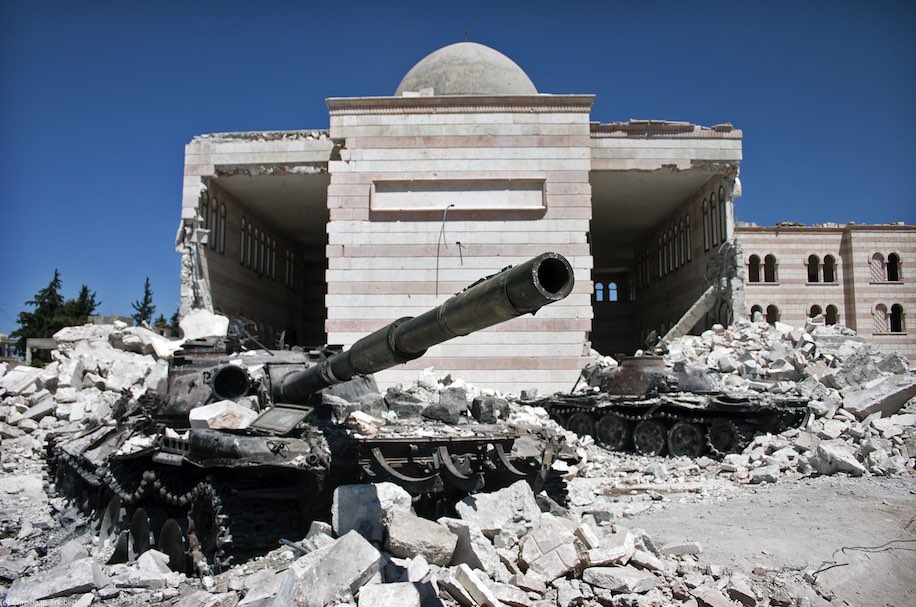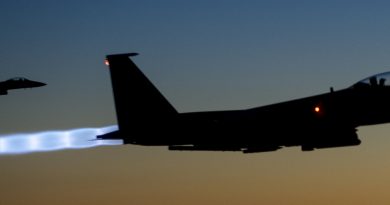Opinion: Will American intervention turn the tides of a bloody civil war?
Since 2011, Syria has fallen into a state of political and militaristic turmoil as rebel forces fight the Syrian army for control of the country. This conflict has given rise to the refugee crisis in Europe, reports of devastating civilian casualty rates, and heightened tensions between the US and Russia as they aid rebels and government forces respectively. In this calamity, many seek to grant what aid they can to alleviate Syrian citizens from repetitive sieges and airstrikes, and many call for a NATO coalition or US military intervention in Syria to end the conflict and suppress what terror groups have taken advantage of the political and military vacuum.
There are more political and cultural factors, however, that prevent such coalitions from being successful. In fighting between rebel groups, which hold a plethora of political or religious beliefs, and outside military aid from Russia and the U.S. have complicated chances of a negotiable ceasefire and subsequent restoration of democracy and political stability. Perhaps in this difficult game of geopolitical chess, the best move – and maybe even winning move – is not to play.
For one, multiple rebel groups have been identified as key players in fighting the Syrian regime ruled by Bashar Al-Assad. And even though some, such as the Iraqi Kurdish groups and the Iraqi government, represent a noble stand against an oppressive government and terror groups alike, most “moderate rebel” groups have been noted as being no better than big-league terrorist organizations operating in the region. In fact, the larger factions of the Free Syrian Army are currently controlled by Islamist groups such as Ahrar al-Sham, which desires to overthrow the syrian government and create an Islamic emirate governed by Sharia Law. Another faction of the FSA is Al-Nustra, which was infamously and ironically labeled a terror group by both the Syrian government and international benefactors of the FSA for its heinous war crimes, which include beheading, killing civilians, religious-based oppression and attempted genocide of the Druze and Yazidi peoples of northern Iraq and Syria.
Another faction, Nour al-Din al-Zinki Movement, received notable media coverage when a video was released showing them beheading a ten-year-old near Aleppo, claiming that the boy was a member of a Palestinian volunteer group aligned with Assad. It has also been known that the Nour al-Din al-Zinki Movement (and other factions of the FSA) is currently being supplied with funding and armaments from the United States, according to an article released by the Arab Chronicle. With these major players and many other smaller factions operating against the Syrian government, it is almost impossible to lend support to any “moderate” rebel group in the region without enabling anti-democratic or anti-western elements, which could prove harmful to political and cultural stability or to international relations should the Syrian government be defeated.
Another significant issue with international support of rebel groups or intervention in Syria is the clash between countries in support of Assad and countries in support of rebel groups in the region. NATO, which includes the US and most nations of the European Union, seeks to arm rebels in response to oppression and militarism committed by the Syrian government. However, Russia seeks to assist Assad and gain a regional ally as well as resources in the region. This clash of interests has heightened tensions between Russia and the NATO coalition, as different airstrikes from multiple nations strike against differing rebel groups and government forces while different arms shipments or ground forces engage each other across several battlefields. This has resulted in a drastically high civilian casualty rate — as well as creating an ongoing war which has lasted several years with little chance for a stable ceasefire or peace agreement to be seen in the near future. Even if the NATO coalition and Russia found common ground and sought out justice for both rebels and the Syrian government, the long lasting impact of current intervention could take many years to overcome, and a weakened Syria could lead to further infiltration of terrorist organizations.
Many of us here in the U.S. would be quick to step up and say that a lack of intervention could weaken the security of the Middle East and create a new plethora of geopolitical tensions and conflicts. However, this U.S.-centric lens does not allow us to accommodate the realities of the current Syrian civil war: that either with outside intervention or without outside intervention, this conflict could last for years — and when it ends we are still not prepared to face the outcome of a victory for either rebel groups or the Syrian government. Either way, we will ultimately fail Syrians and ourselves by not preventing further bloodshed. We have already intervened in Syria for four to five years now, and our intervention in Syria and elsewhere in the Middle East has generated nothing but further tensions and security risks. Perhaps it is better for us as a country and as a global community to intervene only when necessary by coercing either side to create a peace agreement or to reform their methods of holding influence and power rather than stoke the flames of conflict and manipulate it to serve our interests rather than Syria’s. Or, to rephrase, we must pour water on the flames of war rather than gas.







